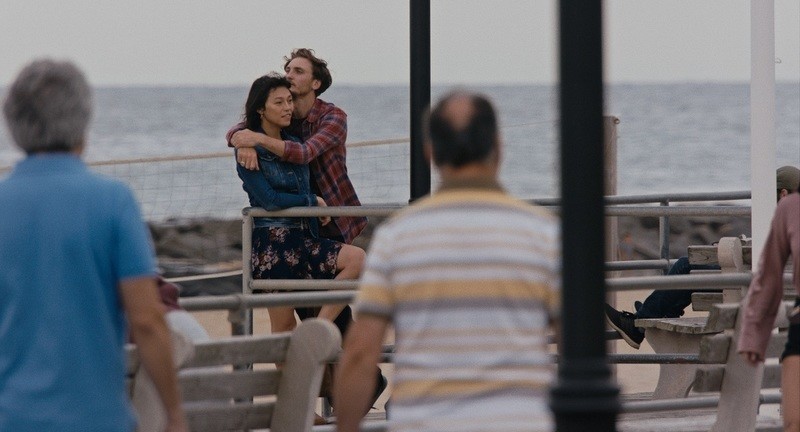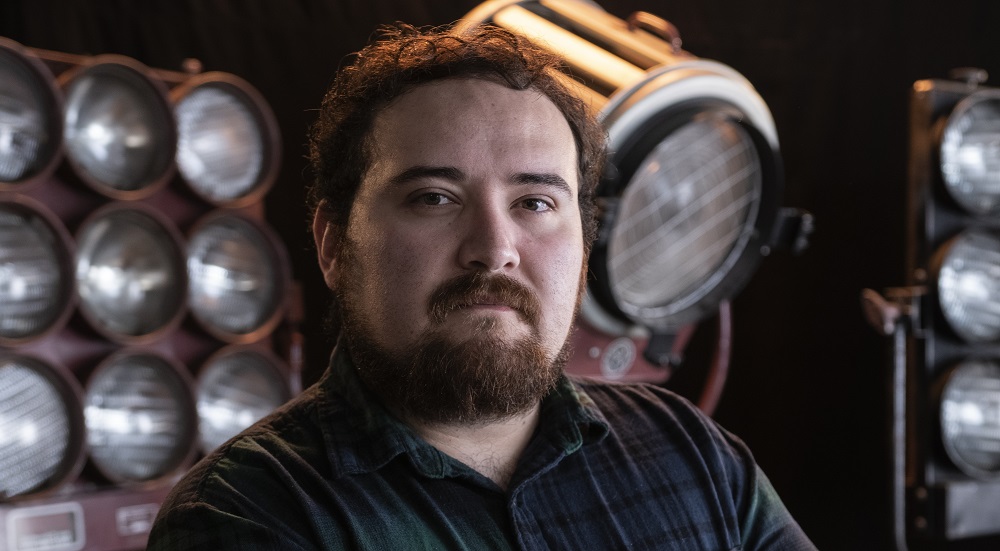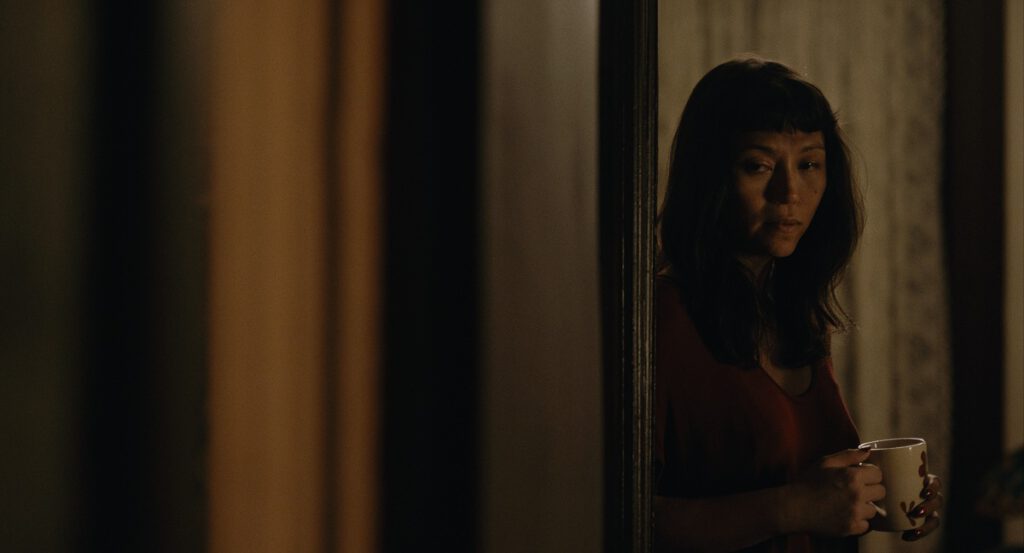Inherently intersectional, Isabel Sandoval’s aptly titled “Lingua Franca” speaks about the common ground between two people each bearing the weight of their personal baggage. As a trans woman of color and an immigrant in this country, the Filipino director shaped her sultry third feature from firsthand sentiments, as well as anecdotes from friends who’ve pursued marriage-based green cards.
Undocumented caregiver Olivia (played by Sandoval herself) lives in Brighton Beach, New York with her elderly client, Olga (Lynn Cohen), and is trying to find a U.S. citizen to wed in order to solve her situation. But when Olga’s troubled grandson, Alex (Eamon Farren), moves in, a romantic relationship develops between them, making her vulnerable and anxious about sharing both her legal status and the details about her gender identity. Raised in a hyper-masculine environment where any deviation from heteronormative norms is rejected, Alex has his own demons to work through.
Sandoval’s sensibilities push the film beyond the realm of verité social dramas and into the company of art that operate with a lyrical touch. “Lingua Franca” is not a vehicle for a straightforward message, but rather a canvas about the interpersonal effects of the relevant issues it tackles, such as the unshakable fear of being deported millions of people have learned to lived with or the apprehension some trans women feel when dating heterosexual men.
Her artistic decisions are precise and built an emotionally restrained narrative set in post-2016 America with matching subdued visual choices. Excited to have the film be released by Array this week, the filmmaker let us into her thought-process behind the linguistically inspired project.
Tell me about the concept of a lingua franca, a common language that allows people from different backgrounds to communicate, in relation to the film. These two characters, which on paper couldn’t be more different, are able to find an unspoken language, which doesn’t always get everything across but helps them create a connection.
It’s interesting because I actually use lingua franca ironically in the film. You just mentioned the dictionary definition, which is a bridge language, what is most important between the characters is what’s left unsaid and unarticulated. “Lingua Franca” is a drama of interiority. And so these are mostly introverted and inward characters that spend the arc of the film, between Olivia and Alex, trying to understand how they feel and to give themselves permission to feel that way in a setting or a sociopolitical milieu that is somewhat oppressive against the feelings that they’re having.
They’re also keeping a secret out of a sense of shame or guilt, specifically Olivia. This is something I had also felt before, I was afraid of I’m putting myself in danger by becoming emotionally involved or sexually intimate with a man who, for instance, is not aware that I’m trans. Also in the case of Alex, he’s very much the product of his upbringing having been raised in a Russian-Jewish neighborhood that’s misogynistic, homophobic, and transphobic. He feels that shame about being found out that he’s emotionally attracted to a trans woman.
Over the course of the film, these two characters try to overcome those hesitations, the fears, and anxieties they have. There’s a sense of kinship and companionship, and an emotional attachment to each other that they’re trying to navigate in the environment that they live in. It’s a delicate and subtle film. Even though on the surface, it’s a romantic drama, this happens in a milieu that’s precisely drawn. It’s set in Trump’s America and I really wanted the film to be informed by that.
On the subject of Trump’s America, the film does a fantastic job at capturing the feeling of perpetual fear that undocumented people feel in this country. In a way, that’s also something that can’t be translated into words. It’s sensorial.
I tell people that while “Lingua Franca” is not an autobiographical film, its temperament very much captures those first few months after Trump got elected to the White House. I was feeling a lot of vulnerability, anxiety, and uncertainty about being a minority here in the U.S. That sensibility kind of organically made its way into how the film feels. Apart from that the narrative, the film really has a mood and I wanted to capture that.
Also, I joke to my friends that I’m a gold-star minority in that not only am I a woman, I’m a trans woman of color, who’s also an immigrant. I feel the absence of privilege in a certain number of ways when it comes to race and gender. I feel that lack of privilege more keenly and more acutely than say a cisgender white person. That’s why my view of an experience of America, more than just as an artist and as a filmmaker, but as a human being is fully formed in that way, socially, politically, and culturally. My approach is that I don’t write characters that live in a vacuum. They are very much influenced and are products of their environments that they thrive in.

As you mentioned, you also made an interesting choice in having the white characters be specifically Eastern-European rather than indistinct, generic “white.” Olga, the woman who Olivia takes care of is an immigrant, and we hear characters in the periphery speak other languages. What was the intention behind this specificity?
Since I moved to the U.S. I’ve always lived in New York, so what I initially found fascinating about New York is that it can seem very white, but it’s truly a melting pot of immigrants. I wanted to make an immigrant story in the sense that aside from just Alex and Olivia, the other important relationship in the film is between Olivia and Olga, who, when you think about it are mirror characters. They’re immigrant women who migrated to the U.S. at different points in their lives. Olivia’s story is more obvious because she’s a more recent immigrant to the U.S. but Olga is a Ukrainian immigrant who moved to the U.S. around the ’60s and ’70s. This relationship shows the past and present of immigration to the U.S. and New York City to be more specific.
There are a couple moments in the film in which Olga and her friend Trixie, who is also a trans woman, discuss not being able to have their passports reflect their identities because of a law in the Philippines. What’s the context behind this reference?
That’s really a personal misgiving of mine because the Philippine legislature passed a law around 10 years ago now prohibiting transgender individuals from changing their name and gender marker, and their passport. Even though I have U.S. green card with my name and gender marker on it, it’s different in my Philippine passport at the moment. I wanted to comment on that as a very real and concrete difficulty that Philippine citizens in the U.S. who are transgender have to navigate, especially when traveling abroad. When the film was invited to the Venice Film Festival last year that was really the first that I traveled abroad since Trump got elected, and I was nervous about being let back in for that reason.
Has the film been released in the Philippines already? If so, what was the reaction? If not, what are your expectations of a potential release there given the subject matter?
It hasn’t been distributed there yet. But it’ll probably be polarizing because its portrayal of transgender women is quite radically different from how we’re portrayed in the Philippines cinema. Trans women usually tend to be portrayed as a very flamboyant, glamorous, or hyper-feminine types that are usually cardboard characters and laughingstock. Mine is a fully fleshed out and complex character, I’d like to think, and that’s not very common in the Philippines. So I hope the audience there will get to appreciate that film when it comes out and what it’s trying to accomplish.
Does this film feel truer to yourself as a person and as an artist than your previous two features, since it’s the first one where you are credited as Isabel?
It’s interesting, it’s my third feature, but it also feels like my first because it’s the first one after my gender transition. It was really important for me to assert my new and real identity this time as a filmmaker. On paper, it sounds like a social issue drama, and it is because it touches on pertinent topics like immigration and the trans experience, but I also really wanted to showcase my aesthetic and my sensibility as a director that I hope people will find unique, distinctive, and singular from both contemporary American or Filipino filmmakers. This is kind of my debut as a new person and as a new filmmaker. I just want to be recognized as having something unique and different to say, as an artist among my their contemporaries.

Aesthetically, do you feel “Lingua Franca” also shows a different facet of you as a director from “Señorita” or “Apparition”?
Yeah, “Senorita” is pulpy. It’s like a combination of Almodóvar and Wong Kar-wai. “Apparition” is closer to austere, European art house in the vein of Ingmar Bergman. This one, “Lingua Franca” feels visually sparse, but also delicate and sensual. I feel like I’m really starting to embrace lyricism and sensuality in my films and it’s a direction that I’m excited about. Cinema is all about seduction.
Near the end of the film there’s a scene in which the character of Olivia, which you play, is playfully asked her name. Instead of responding with the name we known throughout the story, she responds, “Isabel.” Was this a conscious decision to assert yourself on screen?
Its funny because that’s what I just chose spontaneously as a kind of inside joke. That felt right to me, it’s not something that I premeditated or said with a particular intentionality, but it just came naturally to me when we were shooting the scene. It’s funny that you mentioned that because the French film magazine Cahiers du Cinema also mentioned that in their review, saying that I referred to myself as Isabel as if that was my alternate character in “Lingua Franca.”
Are you able to or do you try to make a distinction between your roles as director and as an actress, given that you’ve acted in your won projects on multiple occasions?
I think of myself—and I know it’s not in fashion these days—as an auteur. If you think about it writer-directors tend to write protagonists as kind of alter egos or their doubles in some sense. I definitely wouldn’t be playing Olivia if I didn’t feel like there’s a part of me that I see in her. Also, I played the key creative roles on the film that would ensure I was able translate what was written on the page to the screen according to my vision, and to fulfill that vision without compromise. That’s what I did, and by acting in the film it’s actually one less person to direct because I’m acting in it and I know what I’m trying to achieve.
How significant has Ava DuVernay’s support for the film through her company Array been for you as an artist and for this film? She is a major name in Hollywood, and one of the few who is truly committed to championing voices that are often under-appreciated in the film landscape.
It’s just so thrilling. Although the film premiered in Venice and has been very well received in Europe, especially in France, I feel like Ava and Array rescued the film from potential obscurity here. I feel it’s a hard sell even if it’s a movie that touches on pertinent social issues. It’s not preachy or didactic. It doesn’t give you easy or straightforward emotions at the end of it, you navigate in murkier thematic waters. It’s subtle, it’s complex, it’s layered, and it’s sometimes ambivalent. So I’m really grateful to Ava for seeing that film as the radical and subversive work of art that it is. Ava has always championed and amplified the voices of underrepresented filmmakers like myself and Array itself has quite the remarkable roster of films, including “Burning Cane” by Phillip Youmans last year and the “The Body Remembers When The World Broke Open” from the Berlinale. But what I most appreciate about Ava is that when we were talking about the campaign for this film she empowered and gave me permission to talk about my work as an auteur, and to embrace having a distinctive, singular, idiosyncratic voice.
Do you feel the film is also subversive also in the sense that, unlike many narratives centered on the trans experience, it doesn’t resort to overt violence or tragedy? Instead, “Lingua Franca” takes a more intimate and understated approach to let us into the protagonist’s complex circumstances.
Yeah. We had a few potential investors before who wanted to take the film in that direction to more explicit episodes and outbursts of physical violence and I said, “No.” But I also didn’t portray romance as just lollipops and roses. I made it more real and complex because the violence that the film does explore, which is more psychological and emotional—like for example the gaslighting episode—happens in real life, but it doesn’t always get explored because it’s not easily noticeable or obvious.
I also wanted to portray sexual desire from the perspective of a trans woman in American cinema. We don’t get to see it a lot, especially not like in the two scene of sensuality in the film. The first one is a fantasy sensual sequence. This is a scene of Olivia fantasizing and desiring, not just being the object of that desire, but being an active agent. It’s quite literally the trans female gaze.
The second scene, which is a love scene, is not just your typical scene naked bodies striving against each other. The scene for the most part stays on her face. I wanted that to be a character moment in that while she’s allowing herself to experience sexual pleasure, you can also see the dawning realization in her face of the implications of becoming intimate with a man who isn’t aware that she’s transgender. I think just seeing this woman think, which is, which is an uncommon image in American cinema, I think in the act of thinking there’s such a powerful assertion of identity and personhood. That’s what I wanted to show the audience. While they think they’re seeing a conventional love scene, it’s more about her asserting her agency and identity.
Now playing in select theaters and available on Netflix.












